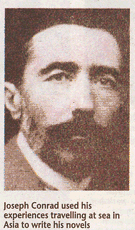Conrad put Asia on the world map
Dato' Dzulkifli Abd Razak
Article
New Sunday Times - 12/02/2007
THANKS to the Polish Embassy and the initiative of its ever energetic ambassador, Malaysians were recently treated to one of the many rich facets of Polish arts and culture.
Article
New Sunday Times - 12/02/2007
THANKS to the Polish Embassy and the initiative of its ever energetic ambassador, Malaysians were recently treated to one of the many rich facets of Polish arts and culture.

Some Malaysians may be more familiar with Poland's invincible tanks, following our country's decision to acquire the vehicles recently.
They may not be aware of Poland' softer side.
So, when a superb flutist was flown in to perform at the Universiti Sains Malaysia's Dewan Budaya (Cultural Hall) last week, another window opened.
The event showcased the extraordinary performance of Jadwiga Kotnowska, a solo performer of exceptional talent.
The audience was mesmerised by the melodious sounds of Kotnowska's flute accompanied by piano.
After this magical treat, Poland has cast its spell over many more people.
To add to the magical spell was an introduction to the Polish-born Joseph Conrad whom many regard as one of the greatest English novelists.
They may not be aware of Poland' softer side.
So, when a superb flutist was flown in to perform at the Universiti Sains Malaysia's Dewan Budaya (Cultural Hall) last week, another window opened.
The event showcased the extraordinary performance of Jadwiga Kotnowska, a solo performer of exceptional talent.
The audience was mesmerised by the melodious sounds of Kotnowska's flute accompanied by piano.
After this magical treat, Poland has cast its spell over many more people.
To add to the magical spell was an introduction to the Polish-born Joseph Conrad whom many regard as one of the greatest English novelists.

During an exhibition held simultaneously to commemorate the birth of the novelist 150 years ago, on Dec3, 1857, we learnt that Jozef Teodor Konrad Korzeniowski took the name Joseph Conrad when he became a British subject in 1886.
Conrad's adventurous way of life was a source of inspiration for many of his writings, eventually earning him as much recognition as Ernest Hemingway, D.H. Lawrence and Graham Greene in the world of English literature.
His style was soon regarded as the forerunner to modern literature, particularly his style and literary approach.
Ironically, though he was clearly a master of the English language, all his life he spoke it with a heavy Polish accent.
In 1886, after gaining both his Master Mariner's certificate and British citizenship, Conrad set sail to various parts of the world, including Australia, the South Pacific Islands, and ports on the Indian Ocean, Borneo and eventually the Malay states.
His sea passages inspired his writings and his works were often based on his travel experiences.
Joseph Conrad used his experiences travelling at sea in Asia to write his novels
In Indonesia, for example, his ship caught fire off Sumatra and he had to spend more than 12 hours in a lifeboat. This experience resulted in a short story, Youth.
In addition, his travels in Southeast Asia furnished him memories recast in Lord Jim (1900) and An Outcast of the Islands (1896).
His many voyages also took him to Bombay (now Mumbai), a journey that inspired his novel The Nigger of the Narcissus (1897).
In 1889, Conrad's childhood ambition was realised when he sailed up the Congo River but fever and dysentery affected his health badly.
By 1894, as his health continued to deteriorate, Conrad was forced to give up the sea and thereon spent more time developing his literary wizardry.
He had served a total of 16 years in the merchant navy.
His first novel, Almayer's Folly (1895), was in fact set on the east coast of Borneo then, followed by An Outcast of the Islands (1896). He began to be known as "a romantic teller of exotic tales".
Conrad married 22-year-old Jessie George, an English lass, in 1896, who bore him two sons.
Joseph Conrad died on Aug 3, 1924 of a heart attack and was interred at Canterbury Cemetery, Canterbury, England.
Today, as we celebrate the 150th anniversary of his birth, many of his exotic tales live on, filling our lives with adventure and romance.
We are greatly indebted to Conrad who had enabled us to have a glance at the world of yesteryear and wonder whether our world could ever be as clean and at peace with itself once more.
